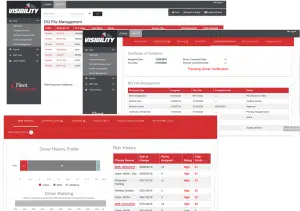23 Jun New Service Takes on the Challenge of Managing Commercial Driver Qualification Files

That’s why, after two years of development and live pilot testing, Fleet Response is now offering management of Driver Qualification (DQ) Files. “We’re helping companies move from lucky to good,” McClure says.
DQ Files are a federal record-keeping requirement for organizations that employ drivers of any vehicle with a gross vehicle weight in excess of 10,000 pounds – essentially anything larger than a Sprinter van. Depending on a company’s structure, responsibility for this job may reside with fleet management, risk management or safety management.
“Clients have been asking us to enter this market for several years,” says Kari Hagan, Director of Client Development at Fleet Response. “For most of our clients, only a portion of their fleet requires DQ Files, but in many cases we run all of their MVRs and keep their Driver History Profiles. They love us for our automations and customizations, and for the ease of using our systems. We’ve been handling the rest of their drivers, and they’ve wanted a one-stop-shop. So that’s what we’ve built.” (Related article: How Automating MVR Sweeps Led to a Reduction in Preventable Accidents)
While maintaining DQ files is a fundamental requirement for any company that operates heavier vehicles, it’s harder than it looks.
“If you manage a lot of files, it can be a nightmare to keep everything straight and up-to-date, and to make sure everyone in your organization is looking at the standards the same way,” McClure says. “And if you have a small fleet, you’re probably not doing it often enough to get good at it.”
McClure offers this summary of the documents the Federal Motor Carrier Safety Administration (FMCSA) requires in a DQ files:
• Application for employment
• Record of road test
• 3 previous years of Motor Vehicle Records (MVR) from each state where the driver holds a commercial license
• Certification of annual MVR review for each driver
• Record of violations from past 12 months
• Medical examiner’s certificate or certified waiver
• Medical card national registry verification
• Hours-of-service form (for vehicles over 26,000 lb. GVW)
While there are only a handful of documents required, each of them has its own series of rules and qualifications, he points out. Further, documentation should align with company policies and be checked regularly for compliance at that level – the deficiency McClure sees most frequently.
For example, if a company ends up in court over an accident, lawyers will ask for DQ files – and then they’ll ask for proof that the driver was onboarded according to company policy; or that internal safety and training policies were followed in light of any incidents that showed up on the most recent MVR.
“You build all this stuff, but if you don’t have the paperwork that connects it to your day-to-day practices, that’s almost worse than having no file at all,” McClure says. “I mean, if you find yourself in court to defend a driver, and they can demonstrate you knew you were required to do any of these things but didn’t, that leaves you in a pretty bad place.”
Fleet Response’s DQ files service provides support at three levels:
1. Managing documentation: This includes digitizing existing paper documents, storing all documents, and making it available on Fleet Response’s VISIBILITY portal – the web-based tool that allows managers to access files on-demand. The system is updated continually as regulations change, to help companies stay up-to-date even if they don’t have in-house DQ file expertise. For example, a new FMCSA Drug and Alcohol Clearinghouse began operating early this year, and has been newly integrated into the system, according to Hagan.
2. Automating and customizing processes: When documents come up for renewal or compliance issues arise – such as a red flag in an MVR – alerts are sent to appropriate personnel and departments, based on the client’s own routines. Forms are made available online to make responses as easy as possible, and to ensure submissions are completed correctly.
3. Auditing and consulting: This may include auditing DQ file records for outdated or missing information; review of internal policies; and mapping company policies to DQF file automations.
“Like everything we do, the services are à la carte,” Hagan emphasizes. “We offer options. If you want to have branch managers or other people involved in auditing files, you can do that. Or you can have us do it and receive whatever information you need to more successfully manage the business and make better decisions. Our goal is to take the work away and relieve the administrative burden – whatever that means to you.”
Fleet Response isn’t the only company that provides DQ file services, but customer focus sets it apart, according to McClure. “This is about service. The main complaint I hear from customers who use other providers is that they don’t get the service they need. When you work with Fleet Response, we’ll do things in a way that makes sense for you and your company, and we’ll identify things that need attention before you do.”
Cost for the service is competitive with industry rates, and lower than many providers. “What we’re providing is a system and tools for companies to make sure they can be compliant,” Hagan says. “With companies that don’t know us, it can take a while to differentiate ourselves. With current clients, that’s not the case. Having experience with Fleet Response is still our best sales tool.”
To discuss the challenges in maintaining your safety and compliance documentation, contact Jeff Fender, Vice President of Sales and Marketing at Fleet Response, contact@fleetresponse.com.

